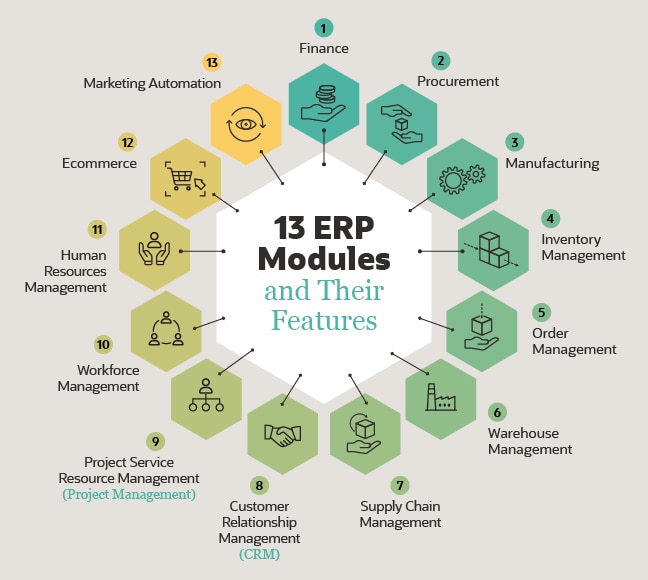Erp modules: types, features & functions
When it comes to managing a business effectively, having the right tools in place is essential. One tool that has become increasingly popular in recent years is an Enterprise Resource Planning (ERP) system. This comprehensive software solution is designed to streamline operations and improve efficiency across an organization.
Understanding ERP Modules
An ERP system consists of different modules, each serving a specific purpose. Let's take a closer look at some of the most common ERP modules:
Finance and Accounting

The finance and accounting module is at the core of any ERP system. It helps businesses manage their financial transactions, automate bookkeeping processes, and generate accurate financial reports. From accounts payable to general ledger management, this module ensures that the company's financials are always up to date and easily accessible.
Human Resources
The human resources module helps companies manage their employees efficiently. It covers a wide range of HR processes, including employee onboarding, payroll management, time and attendance tracking, performance evaluation, and benefits administration. With this module, businesses can centralize their HR data and automate various HR tasks, saving time and reducing errors.
Inventory Management
Effective inventory management is crucial for businesses, especially those involved in manufacturing or retail. The inventory management module within an ERP system enables companies to track their inventory levels, automate purchase orders, manage stock replenishment, and optimize inventory turnover. By keeping a close eye on their inventory, businesses can reduce costs, prevent stockouts, and improve customer satisfaction.
Sales and Customer Relationship Management (CRM)
The sales and CRM module in an ERP system is designed to help businesses manage their sales processes and enhance customer relationships. It enables sales teams to track leads, manage contacts, monitor sales pipeline, and analyze customer data. By centralizing customer information, businesses can provide better customer service, improve sales forecasting, and optimize their sales strategies.
Supply Chain Management
The supply chain management module within an ERP system ensures smooth coordination of all activities involved in the production and delivery of goods or services. It includes modules for demand planning, procurement, production planning, logistics, and order fulfillment. By integrating these processes, businesses can enhance supply chain visibility, reduce lead times, and deliver products or services more efficiently.
As you can see, an ERP system brings various modules together to provide a seamless and integrated solution for businesses. Whether it's managing finances, HR processes, inventory, sales, or the supply chain, an ERP system helps streamline operations and improve overall efficiency.
If you're considering implementing an ERP system for your business, it's important to assess your specific needs and choose a solution that aligns with your goals. With the right ERP system in place, you can gain a competitive edge, optimize your processes, and set your business up for long-term success.